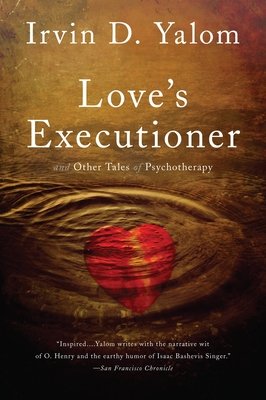Recommended Reading
As a therapist and avid reader, I strongly believe in the power of books to transform our thinking, open our minds to new possibilities, and provide solace when experiencing pain. In my practice, I have seen firsthand how the right book at the right time can lead to pivotal breakthroughs both in therapy and beyond. While I always encourage my clients to seek out books that specifically resonate with them, I have included here a collection of some of my favorite books to support therapy.
Love's Executioner: And Other Tales of Psychotherapy by Irvin D. Yalom
First published in 1989, this is an engaging and beautifully written collection of therapy stories all focused around existential issues or the “givens of existence.” Yalom describes these givens as “the inevitability of death for each of us and for those we love, the freedom to make our lives as we will, our ultimate aloneness, and, finally, the absence of any obvious meaning or sense to life.” This is a surprisingly approachable start to exploring existentialism in therapy and one I return to often.
My Grandmother's Hands: Racialized Trauma and the Pathway to Mending Our Hearts and Bodies by Resmaa Menakem
This is a wonderful book for those interested in trauma and body-centered approaches to therapy. Menakem explores themes of race and racialized trauma, transgenerational trauma, and how these are passed down and held in our bodies. The author includes plenty of somatic activities within this book that the reader can try on their own, making it quite interactive. I highly recommend this as an alternative to The Body Keeps the Score.
Saving Normal: An Insider's Revolt against Out-of-Control Psychiatric Diagnosis, DSM-5, Big Pharma, and the Medicalization of Ordinary Life by Allen Frances
The title pretty much says it all and it seems this book has actually become more relevant since it was first published. The author tackles how the influence of the DSM-5, “Big Pharma”, and the medical industry have led to the explosion of diagnoses to label nearly every aspect of the human experience. Social media has certainly made this even more pressing, as many people are being exposed to misinformation around diagnosis. I believe this book asks the important question: If most of us will meet criteria for a psychiatric disorder at some point in our lives, what does normal actually mean?
When the Body Says No: Exploring the Stress-Disease Connection by Gabor Maté
I strongly recommend this book to anyone who has experienced trauma and who experiences chronic health problems. This book breaks down the connection between mental health and physical health. The author includes many case examples, as well as medical research. I also think this is a great book if you are someone that struggles with psychosomatic symptoms, such as headaches, back pain, and digestive issues.
Rage Becomes Her: The Power of Women's Anger by Soraya Chemaly
This is a must read for any person that struggles with experiencing and expressing anger. So many marginalized people struggle with anger as an emotion, which can end up being turned inward and morphing into depression and anxiety. This book, which is structured as a series of essays, illustrates how suppressing our anger can lead to both internal difficulties as well as maintain systems of oppression in our society. If anger is a difficult emotion for you, or you find yourself bursting into tears anytime you feel angry, I can’t recommend this book enough.
Mating in Captivity: Unlocking Erotic Intelligence by Esther Perel
A great book for anyone in a romantic relationship or who wants to be in a romantic relationship. This explores the realities of modern relationships and the constant struggle between freedom versus security, anxiety versus boredom, and passion versus stability. Esther Perel also has several TED talks which are great introductions to her work.
The Complex PTSD Workbook: A Mind-Body Approach to Regaining Emotional Control and Becoming Whole by Arielle Schwartz
If you are looking for a workbook and activities to do on your own, this one is fantastic. While geared towards individuals with complex PTSD, I personally think the activities in this book are relevant for nearly everyone. The author pulls from a variety of different approaches to therapy, such as Internal Family Systems, Cognitive Behavioral Therapy, mindfulness, somatic therapy, and other trauma-informed approaches, so there is truly something for everyone.
The Sexual Healing Journey: A Guide for Survivors of Sexual Abuse by Wendy Maltz
This is an intense but very helpful book for survivors of sexual trauma that are wanting to redevelop their sexual selves and improve sexual intimacy. This book was written in 1991 and is certainly quite cis-heteronormative, but I still think it is a comprehensive and thoughtful book if you are looking for step-by-step support for reclaiming your sexuality after experiencing abuse. I would recommend this to those who have already done a fair amount of work to address their trauma, but still find they are experiencing challenges related to sexuality.







